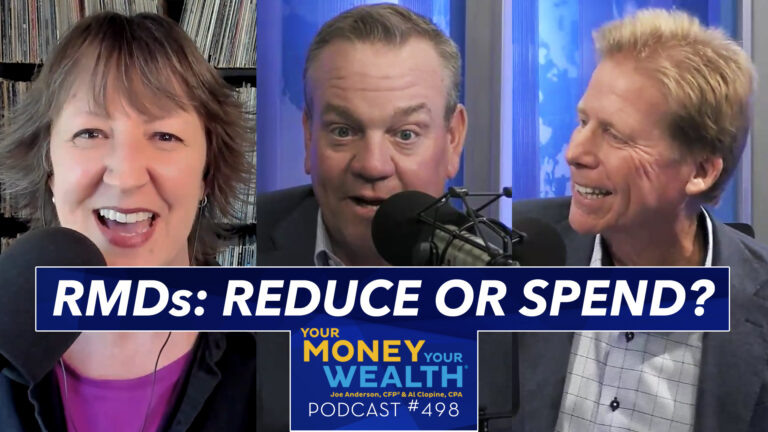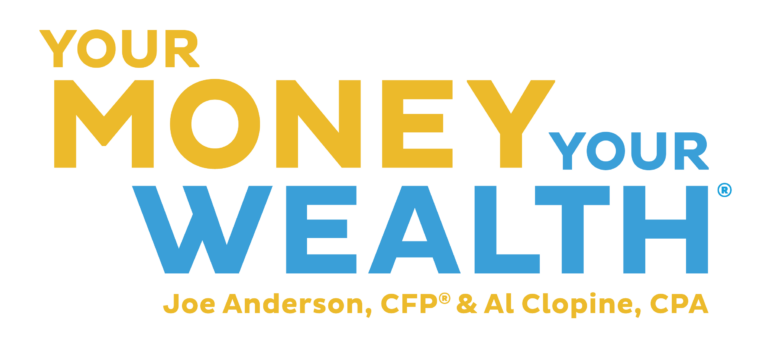Joe Anderson, CFP® and Alan Clopine, CPA discuss a brief history of the tax code and where it might be headed in YMYW podcast episode 87. Find out some possible tax exemptions and deductions under Trump’s presidency; plus, key tax strategies to take advantage of now before the tax code could change. Original publish date December 3, 2016 (hour 1). Note that content may be outdated as rules and regulations have changed.
02:35 “Over the decades, Congress simply amended the tax system by adjusting and assessing new taxes in a series of 17 internal revenue acts. By 1939, the series of tax rules became the first formal internal revenue code. 15 years later was the first real tax reform….tax rates got as high as 91%.”
03:51 “It was in the Fifties that the alternative minimum tax came into play, and that was really designed for the wealthiest of people.”
05:50 “There’s Trump’s plan, and then there’s the GOP plan – there are similarities but [also] some pretty big differences.”
08:02 “Tax reform is not a slam dunk, even though we have a Republican president and a Republican majority in the House and Senate.”
09:50 “Here’s a quick nutshell on the ordinary income tax basis; this is what the proposal is. Right now we have seven brackets. They (GOP) wants to break it down to three. We have a 10%, 15%, 25%, 28%, 33%, 35% and 39.6% bracket. They want to combine the 10% and 15% bracket and call it 12%. Then they’ll combine the 25% and 28% tax bracket and call it 25%. Anything over the 25% tax bracket they’re calling it 33%.”
11:19 “Under Trump, he would like the standard deduction to be $15,000 for an individual and $30,000 for a married couple.”
15:01 “Capital gain rates right now are 0%, 15% and 20% depending on what your income levels are.”
18:07 “If you are in the 10% or 15% tax bracket today, if you sell that asset there is no tax up to the top of the bracket. Here’s a simple example…”
21:48 “You have to understand that things might be changing here, for the good or for the worst depending on what your overall situation is. Get an grasp on your overall situation before the end of the year to make sure you can take advantage of anything you should be taking advantage of this year and set yourself up appropriately for whichever changes may or may not happen.”
26:50 “There are two main proposals on the table right now: the Trump plan and the House GOP plan. They both want to change the way we deduct itemized deductions.”
27:50 “A donor advised fund is kind of like a mini private foundation…”
30:09 “One of the real benefits of the Roth conversion is for you and potentially your beneficiaries will potentially get all of that money tax-free.”
33:48 “Net unrealized appreciation is another one that’s probably on the chopping block. That’s taking stock out of your retirement account, moving it into a brokerage account to enjoy capital gains tax.”
Listen to the YMYW podcast:

Amazon Music
AntennaPod
Anytime Player
Apple Podcasts
Audible
Castbox
Castro
Curiocaster
Fountain
Goodpods
iHeartRadio
iVoox
Luminary
Overcast
Player FM
Pocket Casts
Podbean
Podcast Addict
Podcast Index
Podcast Guru
Podcast Republic
Podchaser
Podfriend
PodHero

Podknife
podStation
Podverse
Podvine
Radio Public
Rephonic
Sonnet
Spotify
Subscribe on Android
Subscribe by Email
RSS feed
IMPORTANT DISCLOSURES:
Pure Financial Advisors is a registered investment advisor. This show does not intend to provide personalized investment advice through this broadcast and does not represent that the securities or services discussed are suitable for any investor. Investors are advised not to rely on any information contained in the broadcast in the process of making a full and informed investment decision.
• Investment Advisory and Financial Planning Services are offered through Pure Financial Advisors, LLC, a Registered Investment Advisor.
• Pure Financial Advisors LLC does not offer tax or legal advice. Consult with your tax advisor or attorney regarding specific situations.
• Opinions expressed are not intended as investment advice or to predict future performance.
• Past performance does not guarantee future results.
• Investing involves risk including the potential loss of principal. No investment strategy can guarantee a profit or protect against loss in periods of declining values.
• All information is believed to be from reliable sources; however, we make no representation as to its completeness or accuracy. As rules and regulations change, content may become outdated.
• Intended for educational purposes only and are not intended as individualized advice or a guarantee that you will achieve a desired result. Before implementing any strategies discussed you should consult your tax and financial advisors.
CFP® – The CERTIFIED FINANCIAL PLANNER™ certification is by the Certified Financial Planner Board of Standards, Inc. To attain the right to use the CFP® designation, an individual must satisfactorily fulfill education, experience and ethics requirements as well as pass a comprehensive exam. Thirty hours of continuing education is required every two years to maintain the designation.
AIF® – Accredited Investment Fiduciary designation is administered by the Center for Fiduciary Studies fi360. To receive the AIF Designation, an individual must meet prerequisite criteria, complete a training program, and pass a comprehensive examination. Six hours of continuing education is required annually to maintain the designation.
CPA – Certified Public Accountant is a license set by the American Institute of Certified Public Accountants and administered by the National Association of State Boards of Accountancy. Eligibility to sit for the Uniform CPA Exam is determined by individual State Boards of Accountancy. Typically, the requirement is a U.S. bachelor’s degree which includes a minimum number of qualifying credit hours in accounting and business administration with an additional one-year study. All CPA candidates must pass the Uniform CPA Examination to qualify for a CPA certificate and license (i.e., permit to practice) to practice public accounting. CPAs are required to take continuing education courses to renew their license, and most states require CPAs to complete an ethics course during every renewal period.










